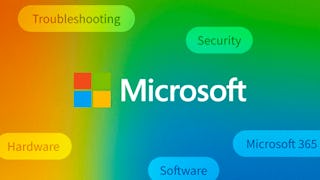
IT Certification Roadmap: A Guide
There are many IT certifications—here's a quick guide to navigating them.
April 16, 2021
Article
Explore the key skills and qualifications needed for a career in information technology. Learn how professionals in roles such as IT support specialist play a crucial part in keeping organizational technology systems running smoothly.

Explore popular IT support courses

Microsoft
Skills you'll gain: Microsoft 365, Network Security, Business Software, Computer Hardware, Cybersecurity, Microsoft Office, Desktop Support, Virtual Private Networks (VPN), Network Troubleshooting, Technical Support, Hardware Troubleshooting, Generative AI, Operating Systems, Collaborative Software, System Support, Network Protocols, TCP/IP, Application Security, Microsoft Teams, Cloud Computing
Beginner · Professional Certificate · 3 - 6 Months

Skills you'll gain: IT Security Architecture, Computer Networking, Operating System Administration, Package and Software Management, Network Troubleshooting, Systems Administration, Cloud Infrastructure, IT Infrastructure, TCP/IP, Network Security, File Systems, Microsoft Windows, Computer Security, Network Architecture, Computer Hardware, Technical Support, Software Installation, Interviewing Skills, Professional Development, Google Gemini
Build toward a degree
Beginner · Professional Certificate · 3 - 6 Months

Skills you'll gain: Computer Hardware, Technical Support, Software Installation, Technical Documentation, Hardware Troubleshooting, Customer Support, Computer Networking, System Software, Technical Communication, Computer Literacy, Linux, Microsoft Windows
Beginner · Course · 1 - 3 Months
In today's data-driven world, professionals skilled in IT disciplines are in high demand across many industries. A career in this fast-growing field provides opportunities to use technical skills to drive meaningful business impact. Explore the diverse career paths, essential skills, and job types within IT to start your journey in this exciting and rewarding domain.
Interested in entry-level IT? Find out more about what information technology is and common entry-level roles.
Interested in CompTIA A+? Read about the CompTIA A+ certification, and explore other certifications for IT professionals.
Interested in solutions and support? Dive into a solutions engineer's daily work and learn more about what a technical support engineer does.
Ready to start learning? Explore our catalog of IT support, CompTIA A+, and technical support courses for beginners and experienced professionals.
Though this depends on the role, many entry-level IT positions request some knowledge of operating systems, computer security, networking principles, and troubleshooting. If you want to go into software or web development, a versatile and popular programming language like Python can be good to learn.
If you’re stuck, try finding a few positions you’re interested in on a job search website to see what skills are commonly requested.
Typically, an IT certification refers to a qualification you receive that shows your competency in a specific field of information technology (IT). To get a certification, you generally must pass an exam that tests your capabilities and skills in the field.
IT courses on Coursera are structured to accommodate learners at various levels: